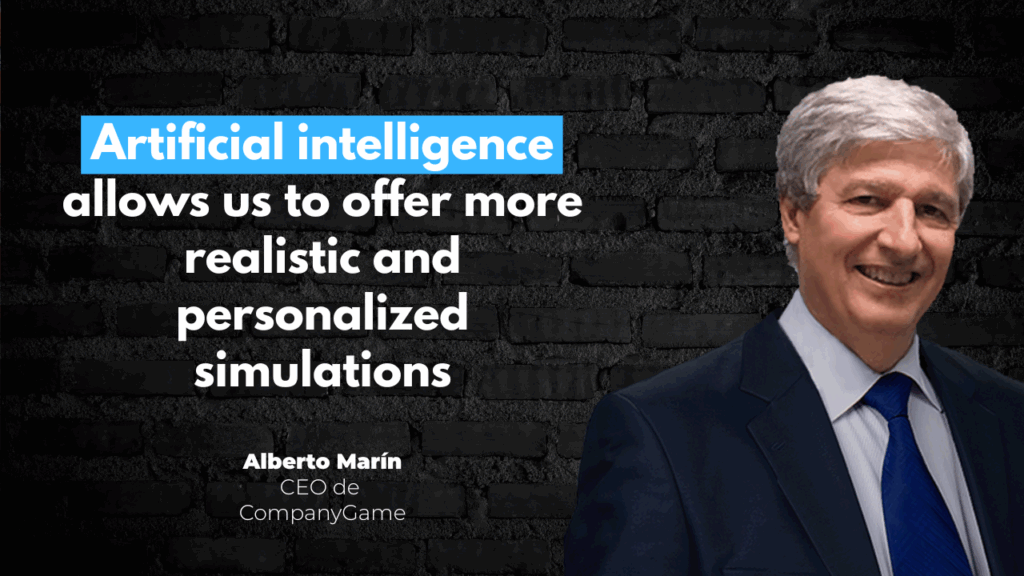In an increasingly complex and fast-changing business environment, traditional education is no longer enough to prepare future leaders. CompanyGame was born with a disruptive vision: to transform business education through interactive simulators, advanced gamification, and artificial intelligence.
In this interview, Alberto Marín, founder of CompanyGame, shares the story behind the project, its evolution, the challenges faced in the educational sector, and how his company is revolutionizing the way students and professionals develop key real-world skills. A conversation about innovation, technology, and the future of business learning.
Alberto Marín Interview
How did CompanyGame start, and what was the motivation behind this business project?
CompanyGame was created with the goal of transforming business education through gamification. We observed that traditional teaching methods were too theoretical and didn’t allow students to develop practical skills in a safe environment. That’s why we decided to create business simulators that replicate real-life scenarios, allowing users to learn by doing—without risk.
What is CompanyGame’s current main mission?
Our mission is to improve business management training and foster entrepreneurship through interactive simulators and innovative tools. We want students and professionals to acquire key skills such as strategic decision-making and problem-solving in a dynamic and realistic environment.
How has the business simulation sector evolved from the beginning to today?
The sector has evolved tremendously. In the beginning, simulators were more basic and spreadsheet-based. Today, thanks to artificial intelligence, big data, and personalization, we offer much more immersive experiences tailored to each user. Moreover, simulation-based learning has become increasingly accepted in both universities and businesses.
What are the main advantages of using simulators over more traditional educational methods?
Simulators allow users to practice without risks, make decisions in real time, and learn from their mistakes. They also foster critical thinking, collaboration, and adaptability—key skills in today’s business world. Unlike traditional methods, they not only transmit knowledge but also develop essential skills within organizations.
What role do professors play in simulation exercises?
The role of the professor is essential. By design, simulators present challenges that can be complex for students. These require the professor’s support to be properly understood and addressed. During the simulation, the professor must motivate students to engage fully, while also ensuring they use the appropriate methods.
What sets CompanyGame apart from the competition?
We stand out due to our wide range of simulators, expert advisory services, and a unique combination of advanced gamification, personalization, and continuous updates. However, we believe our real differentiator is guiding our clients through the transformation of the teaching-learning process. We put great effort into driving innovation within our clients—this is our greatest strength.
Can you elaborate on the combination of simulation and advanced gamification?
We’ve found that professionals and students enter simulation exercises with varying levels of technical knowledge, which can limit the learning impact. While professors play a key role in bridging this gap, they often don’t have enough time. That’s why we’re supplementing simulations with gamified activities to reinforce technical knowledge, and using AI to create characters with specific roles—such as bankers or consultants—that interact with users and enrich the learning experience.
In your opinion, what percentage of companies or universities currently use business simulations in their programs?
We don’t have precise figures, but we estimate that only about one-third of companies and institutions use these methodologies. There are three main reasons for this. The first is a lack of awareness about the learning impact of these tools. Many companies and universities are still used to traditional methods and may doubt the effectiveness of simulators.
The second is a lack of interest or commitment to educational innovation. This is often linked to a fear of innovation or difficulty involving professors in the innovation process. Until this methodology is tested, its full value—what we call the “student effect”—is not understood. The student becomes the protagonist in the process, which in turn supports the professor’s role. Professors do need training, but once they are familiar with the methodology, the teaching-learning process becomes much more intuitive and dynamic.
The third—and I believe most important—is the difficulty of finding an expert to guide them through the journey, which is not an easy path. Companies and institutions need someone who can advise them on the best way to integrate this methodology into their training programs, train academic authorities and professors, and support them in ensuring success. We’ve seen that organizations that work with us using this approach progress quickly and achieve great results.
Switching gears, how does CompanyGame ensure that its simulators stay up to date with business trends and changes?
We maintain close relationships with companies, universities, and experts in various fields and sectors around the world to ensure that our simulators reflect current business challenges and realities. Additionally, we integrate artificial intelligence and data analytics to continuously improve the user experience.
What do you think is the future of business simulators?
The future points toward even more immersive simulations, using augmented reality, advanced AI, and adaptive learning. We’ll also see greater integration with microcredentials and certifications that validate the skills acquired through simulators, making them even more valuable in the job market.
We’re working to ensure that our platform enables continuous tracking of students’ and professionals’ competency development over time. We’re seeing very promising results in our pilot projects. The future of education is truly exciting, with the integration of traditional and innovative methodologies—empowered and enhanced by artificial intelligence.

